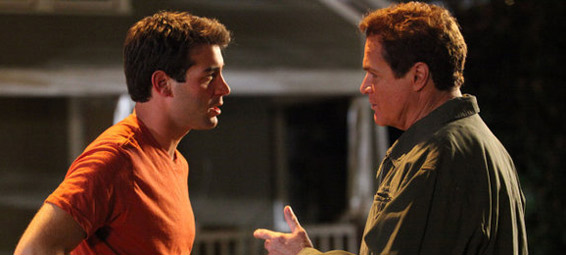Could it be that the thing that John Allen most enjoys about stealing money is the quality time that it allows him to spend with his son? Tonight’s second episode of Lone Star leaves the distinct impression that John gets more satisfaction from the chance his crimes give him to serve as a role model for Bob than from the money he takes from his victims. He’s a con man who likes the thrills in his life, and who takes pride in the young man he’s raised to follow in his footsteps.
So he can’t help but take personally Bob’s decision to reject their original plan for fleecing Thatcher Oil. Bob ran off to Las Vegas to marry his Midland girlfriend, giving him two wives and a plan to make a big pile of money in a legal manner (well, sort of legal.) John doesn’t like it one bit. At first he’s unmoved by Bob’s explanation of how he’s taken $1 million from Thatcher Oil, bought some land in Midland to help cover his crimes there, and will use a legitimate investment in a wind farm to make enough money to pay off the people he swindled. John thinks Bob is asking to get caught.
But Bob has a plan. He intentionally reveals to Clint Thatcher that he’s taken and invested the million dollars without his permission. Then he tells Clint he’s quitting rather than working within the intensely corporate culture of the oil company. Meanwhile, he lures the good-for-nothing-but-bedding-the-ladies son of the family, Drew, to leave his family company to come work with him on the wind farm deal. Robert calculates right, and Clint acts quickly to bring his son and his son-in-law (Bob) back into the family fold by investing in the wind deal.
Left on his own, we watch as John runs a scheme where he rents the same foreclosed home to a dozen people in the same day. He’s left with a big pile of cash, but something is missing. It’s just not the same, without Bob there to play along. It makes sense, in a way. What good is being a con man if there isn’t someone around to appreciate how easily you were able to fool the suckers?
So John finally joins Bob’s scheme, but quickly comes to regret it when he finds himself stuck working out of a sad little cubicle at the Thatcher Oil headquarters while he watches his son run off for a power lunch with Clint Thatcher and a private jet flight back to Midland. His restlessness grows when he can’t figure out how to operate the voice mail on his office phone, and older Thatcher son Trammell berates him for it.
Back in Midland, Bob’s new wife Lindsay begins planning another wedding, since the young couple feels guilty for not having had a ceremony that her parents could attend. When her mother points out that she doesn’t know any of Bob’s work friends, nor where he grew up, or where he went to school, she gets suspicious of his past and goes looking through an old yearbook. She even calls his old high school to check to see if there’s any record of his having been there.
But it’s her sister Gretchen – the black sheep of her family, who’s come home for the wedding — who grows most suspicious of Bob, after he accidentally leaves his Houston phone in Midland when he’s transitioning from one life/wife to his other. Gretchen calls the first number on the phone — John’s — and is shocked to to hear a man answer “What is it, son?” She doesn’t buy Bob’s explanation that John is his business acquaintance and that he calls everyone “son.” She might well make trouble for our overly romantic con man.
When John encounters Clint in an office elevator and hears that Bob has claimed that his father abandoned him as a child, he decides that he can’t go along with this plan anymore. He and Bob have a falling out over the wisdom of the plan just before Bob returns to Midland.
Back in Houston, John hatches his own plan to make off with millions or tens of millions of Thatcher Oil’s money. He takes Drew out for some heavy drinking and steals the Thatcher son’s access card as he puts him in a cab (shot outside Kenichi in Victory Park). He sneaks back into the company headquarters, pours over some files, and then makes a mysterious phone call to an unseen accomplice.
“Listen, I’ve got a monster on my hands. I need a little help with it,” he says. “No, Bob’s doing his own thing. I’m taking this one down alone.” It seems that, if he’s lost his son, then he’ll just have to take the money.
So, who’s on the other end of that phone? Bob’s mom? Grandfather? Or will Lone Star be canceled before we find out?
(Image: James Wolk and David Keither as Robert and John Allen in Lone Star.)






